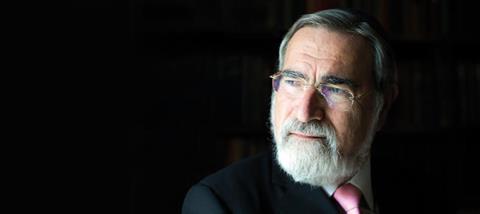
Many people believe religion is the major cause of conflict. How do you respond?
Early in the book I cite The Encyclopedia of Wars which explores 1,800 military conflicts. It shows that 10% of wars have a religious cause and 90% don’t. So the truth is that religion sometimes is the cause of violence, but quite rarely.
Many secular voices seem to reiterate what John Lennon wrote in ‘Imagine’: If there were no religion, we could ‘Imagine all the people living life in peace.’ Why do you think that’s a pipe dream?
It’s worse than a pipe dream – it’s wilful delusion.
In the 19th century, [in Europe] people came up with three substitutes for religion as a way of bringing people together. Nation-state, race and political ideology – in particular, Marxism. The nation-state brought us two world wars. The worship of race brought us the Holocaust. The worship of Marxism brought us Stalin, the KGB and the Gulag.
The end result was at least 100 million people losing their lives. Anyone who thinks that we can abolish religion and have peace ever after, has simply never read the history of the 20th century.
Yet there seems to be this optimism that now we know science, we can use our reason.
Science tells us how; it doesn’t tell us why. The three great questions that every reflective human being must ask at some stage in [their] life cannot be answered by science…Who am I? Why am I here? How then shall I live?
What do you say to criticisms that the Abrahamic religions are inherently violent because of how God is represented in the Old Testament?
Clearly that cannot be true because in the 8th century BCE, Isaiah and Micah become the first people in all of history to speak of peace as an ideal.
It’s Isaiah and Micah, incidentally, who give us that famous saying carved in stone by the United Nations building in New York, of a world where nation will not lift up sword against nation.
Not only did the prophets turn Israel in the direction of peace, so did the rabbis 2,000 years ago when they sat and took a formal vote that…none of those campaigns in the books of Numbers, Deuteronomy and Joshua apply anymore. The only kind of war permitted in Judaism is a war of self-defence.
How has Judaism in particular given us a sense of what it means to be human?
The last time the West faced religious wars on the scale that are currently being fought in the Middle East was in the 17th century. John Milton, Thomas Hobbes, John Locke and Benedict Spinoza all sat down and read the Hebrew Bible.
They came up with the five most powerful ideas that shaped the modern world namely social contract, the moral limits of power, the doctrine of toleration, liberty of conscience and perhaps the most important of all the inventions of the 17th century, the concept of human rights.
Way beyond that, of course, are the fundamental elements that form the Judeo-Christian heritage; namely forgiveness, compassion, charity and the importance of the family, love as a fundamental force driving human society. All of these form the Judeo-Christian heritage that makes the West the great civilisation that it is.
Not in God’s Name (Hodder) is available now


























